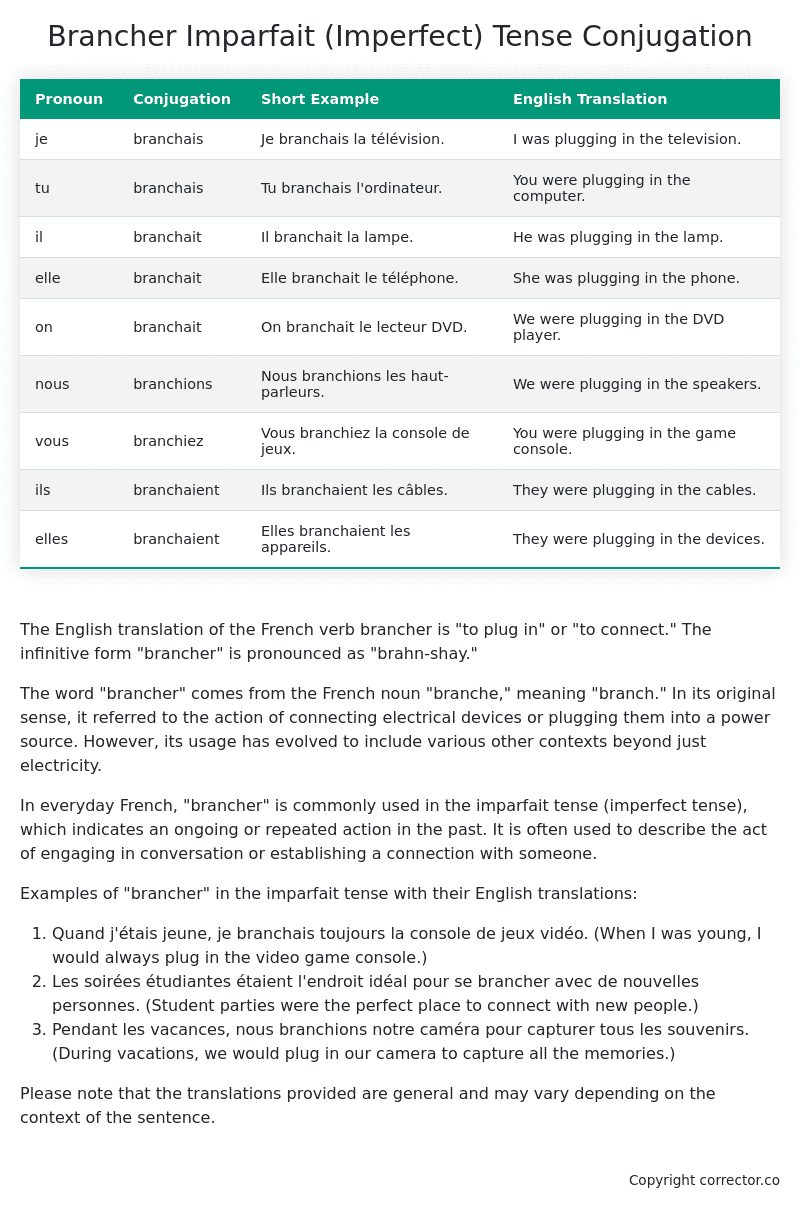Imparfait (Imperfect) Tense Conjugation of the French Verb brancher
Introduction to the verb brancher
The English translation of the French verb brancher is “to plug in” or “to connect.” The infinitive form “brancher” is pronounced as “brahn-shay.”
The word “brancher” comes from the French noun “branche,” meaning “branch.” In its original sense, it referred to the action of connecting electrical devices or plugging them into a power source. However, its usage has evolved to include various other contexts beyond just electricity.
In everyday French, “brancher” is commonly used in the imparfait tense (imperfect tense), which indicates an ongoing or repeated action in the past. It is often used to describe the act of engaging in conversation or establishing a connection with someone.
Examples of “brancher” in the imparfait tense with their English translations:
- Quand j’étais jeune, je branchais toujours la console de jeux vidéo. (When I was young, I would always plug in the video game console.)
- Les soirées étudiantes étaient l’endroit idéal pour se brancher avec de nouvelles personnes. (Student parties were the perfect place to connect with new people.)
- Pendant les vacances, nous branchions notre caméra pour capturer tous les souvenirs. (During vacations, we would plug in our camera to capture all the memories.)
Please note that the translations provided are general and may vary depending on the context of the sentence.
Table of the Imparfait (Imperfect) Tense Conjugation of brancher
| Pronoun | Conjugation | Short Example | English Translation |
|---|---|---|---|
| je | branchais | Je branchais la télévision. | I was plugging in the television. |
| tu | branchais | Tu branchais l’ordinateur. | You were plugging in the computer. |
| il | branchait | Il branchait la lampe. | He was plugging in the lamp. |
| elle | branchait | Elle branchait le téléphone. | She was plugging in the phone. |
| on | branchait | On branchait le lecteur DVD. | We were plugging in the DVD player. |
| nous | branchions | Nous branchions les haut-parleurs. | We were plugging in the speakers. |
| vous | branchiez | Vous branchiez la console de jeux. | You were plugging in the game console. |
| ils | branchaient | Ils branchaient les câbles. | They were plugging in the cables. |
| elles | branchaient | Elles branchaient les appareils. | They were plugging in the devices. |
Other Conjugations for Brancher.
Le Present (Present Tense) Conjugation of the French Verb brancher
Imparfait (Imperfect) Tense Conjugation of the French Verb brancher (You’re reading it right now!)
Passé Simple (Simple Past) Tense Conjugation of the French Verb brancher
Passé Composé (Present Perfect) Tense Conjugation of the French Verb brancher
Futur Simple (Simple Future) Tense Conjugation of the French Verb brancher
Futur Proche (Near Future) Tense Conjugation of the French Verb brancher
Plus-que-parfait (Pluperfect) Tense Conjugation of the French Verb brancher
Passé Antérieur (Past Anterior) Tense Conjugation of the French Verb brancher
Futur Antérieur (Future Anterior) Tense Conjugation of the French Verb brancher
Subjonctif Présent (Subjunctive Present) Tense Conjugation of the French Verb brancher
Subjonctif Passé (Subjunctive Past) Tense Conjugation of the French Verb brancher
Subjonctif Imparfait (Subjunctive Imperfect) Tense Conjugation of the French Verb brancher
Subjonctif Plus-que-parfait (Subjunctive Pluperfect) Tense Conjugation of the French Verb brancher
Conditionnel Présent (Conditional Present) Tense Conjugation of the French Verb brancher
Conditionnel Passé (Conditional Past) Tense Conjugation of the French Verb brancher
Conditionnel Passé II (Conditional Past II) Tense Conjugation of the French Verb brancher
L’impératif Présent (Imperative Present) Tense Conjugation of the French Verb brancher
L’impératif Passé (Imperative Past) Tense Conjugation of the French Verb brancher
L’infinitif Présent (Infinitive Present) Tense Conjugation of the French Verb brancher
L’infinitif Passé (Infinitive Past) Tense Conjugation of the French Verb brancher
Le Participe Présent (Present Participle) Tense Conjugation of the French Verb brancher
Le Participe Passé (Past Participle) Tense Conjugation of the French Verb brancher
Struggling with French verbs or the language in general? Why not use our free French Grammar Checker – no registration required!
Get a FREE Download Study Sheet of this Conjugation 🔥
Simply right click the image below, click “save image” and get your free reference for the brancher imparfait tense conjugation!

Brancher – About the French Imparfait Tense
NOTE: To take a deep dive into all the French tenses then see our article on Mastering French Tense Conjugation.
Formation of the Imparfait Tense
For regular -er verbs:
For regular -ir verbs
For regular -re verbs
Common Everyday Usage Patterns
Description of Past Habits
Background Information
Mental and Emotional States
It’s employed to express emotions, thoughts, or physical sensations in the past. For example: “J’étais content quand il est arrivé.” (I was happy when he arrived.)
Ongoing Actions
Points to Note About the Imparfait Tense
Passé Composé vs. Imparfait
Conditional
Si Clauses
Narration
I hope you enjoyed this article on the verb brancher. Still in a learning mood? Check out another TOTALLY random French verb imparfait conjugation!


